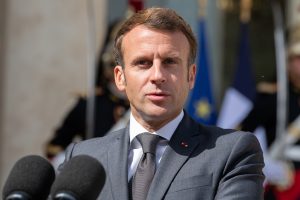Illusory Visions of Strategic Autonomy: Emmanuel Macron Wins France, Loses Europe

President Emmanuel Macron
This Sunday, most French voters held their nose as they granted President Emmanuel Macron a second term in office. Faced with an impossible conundrum – how to spark change without upsetting the apple cart – France reluctantly concluded that President Macron represented the lesser of two perceived evils.
Securing a landslide victory by any standard, and the first president in twenty years to gain a second term whilst in full control of the government, Mr Macron conceded that his job now includes addressing the grievances of those who voted for Marine Le Pen. In his victory speech the president struck a conciliatory note and promised a more collective approach to governing. He also acknowledged the support received from critics on the left who voted for him only to keep the far-right at bay.
President Macron is not out of the woods yet and must quickly ready his La Republique en Marche party for the June legislative election – aka the ‘third electoral round’. With the centrist parties in disarray, both La France Insoumise on the left and the Rassemblement National on the right will eagerly exploit the general discontent – a malaise expressed in an abstention rate of 28% – to clip the president’s wings.
A Victory of Sorts
Though third time unlucky in securing the keys to the Élysée Palace, Marine Le Pen claimed her 42% share of the runoff vote as a “victory in itself.” She also promised to continue the “fight” but no longer as a presidential hopeful, although she did leave the door slightly ajar for a renewed bid.
Though inexperienced in government, Ms Le Pen has been remarkably successful in keeping her party united whilst detoxifying it of more extremist xenophobic elements – including her own Holocaust-denying father. She even ditched Frexit, dropped support for the death penalty, and downplayed earlier pledges to take France out of the NATO command structure.
Softening her image with a new neutral-toned wardrobe, repeated references to her love of cats, and smiles aplenty, Ms Le Pen managed to charm some five million more voters than she did in 2017. She now must leverage her considerable standing to keep those waiting in the wings from fracturing the party.
Though victorious, President Macron’s inbox is stuffed with problems of either an intractable or contradictory nature. His vow to give a voice to the ‘silent 28%’ is easier made than honoured. Whilst statistics show that only about 5% of the French are worse off today than they were five years ago, the recent surge of inflation puts a squeeze on purchasing power and causes much concern – and bickering.
Great Reformer
In his role as Great Reformer, President Macron will continue to experience considerable pushback to his plan for progressively raising the retirement age from 62 to 65 by 2031. He failed to do so during his first term after the large-scale protests of the ‘Gilets Jaunes’ erupted and transformed downtown Paris into a veritable battle zone for weeks on end. Mr Macron has now invited unions and employers for a tripartite round of consultations and promises not to impose his reform agenda by presidential decree.
Sunday evening, a distinct sigh of relief was heard in European capitals when projections, generally very accurate, showed Mr Macron the clear winner of the presidential race. With a war raging in Ukraine and a European Union already beset by countless challenges, an unstable, unreliable, and unpredictable France was just about the last thing missing from a storm that keeps perfecting its rage.
Foreign Minister Jean-Yves Le Drian said the French people had voted for the preservation of their values against a “narrow vision” of the nation. The French do not generally love their presidents which makes the re-election of Mr Macron even more notable. German Chancellor Olaf Scholz called the outcome a “vote of confidence in Europe.” In an opinion article published last week by Le Monde, Chancellor Scholz cautioned French voters against choosing a candidate who “openly sides with those who attack our freedom and democracy.”
Though the danger of the EU’s second largest economy succumbing to far-right extremism has, for now, passed, President Macron must not forget that he may cling to power for another five years only because of the far-left’s support. Calculating that he had more to gain on the right than to fear on the left, Mr Macron subtly shifted his position on immigration and national identity to nibble away at Ms Le Pen’s following. His decision to confront “Islamist separatism” by shuttering several mosques and Islamic associations – often on flimsy legal grounds – sought to reassure those on the right concerned over a watering down of French national values.
Crashed Edifice
In Europe, President Macron is expected to continue his push for ‘strategic autonomy’ although its intellectual edifice seems to have crashed and burned in Ukraine. Before Russia invaded her neighbour, Mr Macron’s grand vision for Europe as a suis generis civilisation – whose destiny cannot be determined at the margins of Asia or on the other side of the Atlantic – pointedly included Moscow.
He fêted Russian President Vladimir Putin at the Élyséee and Versailles palaces and philosophised openly about a ‘new continental architecture’ based on trust and a ‘clarification’ of the relations between West and East. Talk was in the air of a grand strategic rearrangement and a pivot away from traditional allies and towards European autonomy.
President Macron tried, and failed, to convince President Vladimir Putin of his vision which evaporated the instant the first Russian artillery barrage struck Ukraine on February 24. His bet on diplomacy, laudable as it may have been, did not pay off as expected and saw France relegated to a relatively minor role as the rest of Europe – possibly excepting hesitant Germany and recalcitrant Hungary – rushed to provide lethal military kit to embattled Ukraine and promptly gained a renewed appreciation for NATO and American military might.
His profound misconceptions about Europe’s destiny and place in the world have shattered President Macron’s dream of leading the continent. Apart, possibly, from European Commission President Ursula von der Leyen and European Council President Charles Michel – both singularly lacking charisma – there is nobody with the qualities, stature, and appeal needed to lead the continent as a it grapples with the biggest armed conflict on its soil since World War 2. German Chancellor Olaf Scholz would be an obvious choice if not for his endless wavering and overly cautious approach to anything resembling action.
French voters may have expressed their confidence in Europe, and for now all remains stable, but that doesn’t imply that any of the EU’s challenges have been met.
You may have an interest in also reading…
No Gloating on First Anniversary of DC Riots: Misguided Republican Anger at a Beneficial Electoral System
She called it a “beautiful sight to behold” when student protesters stormed the building that houses the Hong Kong Legislative
Uncertainty and Pessimism Surround Emergence of the Omicron Variant
The Omicron variant will either be a major development in the Covid-19 crisis… or a blip on the ever-changing, post-pandemic
Plus ça Change: Mired in Multiple Crises, Lebanon Votes for Continuity
In a scathing indictment of the country’s political elite, Lebanon tumbled some 25 places on the annual United Nations World


















































































